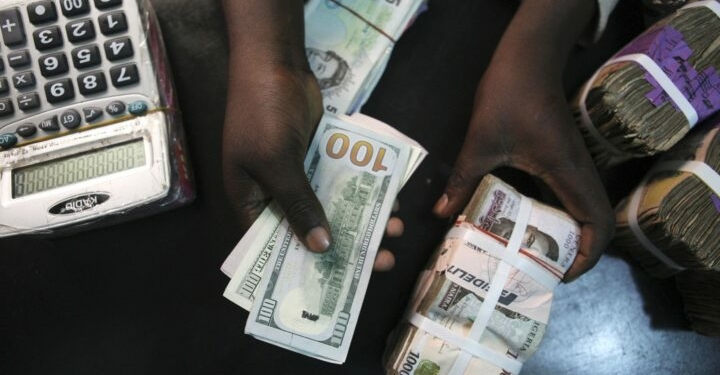- CEO Adetilewa Adebajo cited illegal financing and excessive Ways and Means financing as primary contributors to Nigeria’s foreign exchange issues, leading to inflation and economic challenges
- Professor Bonga Adi highlighted core challenges facing Nigeria’s economy, including exchange rate instability, high inflation, and high interest rates, which erode investor confidence and hinder business operations
Economic experts have shed light on the primary factors behind Nigeria’s escalating foreign exchange crisis. The exchange rate in the parallel market has recently surpassed N1,200 per US dollar, signifying a deepening dollar scarcity.
Mr. Adetilewa Adebajo, the CEO of Corporate Finance Group, emphasized that illegal financing in Nigeria is a significant contributor to the foreign exchange issues the country is facing. Speaking during an interview on Channels TV’s Politics Today, he explained that this illegal financing has led to inflation, which, in turn, is undermining Nigeria’s economy.
Adebajo stated, “Let’s understand what is causing this foreign exchange problem. First, we have N30 trillion in Ways and Means financing, which is illegal. Ways and Means financing falls under the CBN’s balance sheet and is now 30 times over the limit, which is excessive. This is exerting pressure on inflation.”
He further pointed out that the most significant challenge today is inflation, with negative real rates and utility. As a result, keeping money in an account results in a loss of approximately 11% each year due to inflation. The high inflation rate is driving up the demand for foreign exchange, as people use it as a store of value.
Additionally, Professor Bonga Adi, an economics expert from the Lagos Business School, noted that even if the government fulfils its promise to inject forex into the system, the appropriate mechanisms are crucial to stabilizing the naira. He identified three core challenges facing Nigeria’s economy: exchange rate instability, inflation, and high-interest rates. These issues are eroding investor confidence and making business operations difficult.
Adi stressed that these economic challenges, including exchange rate instability and high inflation, undermine investors’ confidence and impede their willingness to invest in the Nigerian market.
Regarding the government’s announcement of $10 billion in funding to alleviate the population’s suffering, Adi underscored the significance of the mechanisms surrounding this allocation. While the inflow of $10 billion is expected to alleviate some of the supply-side challenges in the forex market, it’s essential to consider the mechanisms that will govern the utilization of these funds.
Tope Fasua, the Special Adviser to the President on Economic Affairs in the Office of the Vice President, expressed that the government anticipates the $10 billion inflow in weeks. Fasua affirmed that the government is working to address the root causes of the naira’s continuous depreciation and curb the influence of the black market on the forex situation. He mentioned discussions with foreign investors willing to invest in the country as part of the government’s efforts to stabilize the forex market.








Discussion about this post